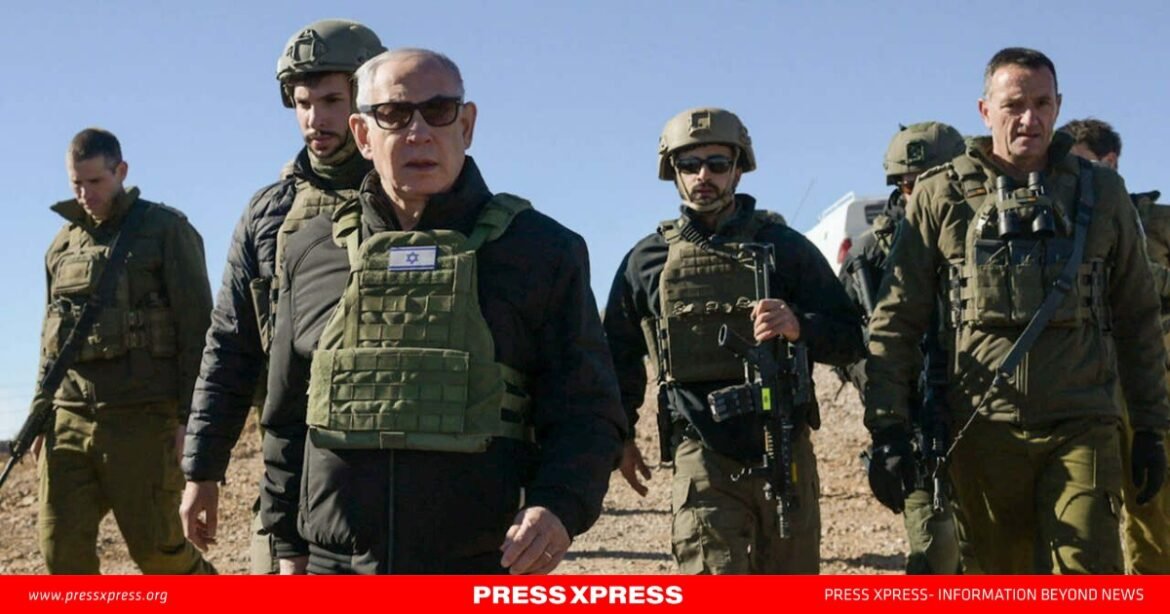Israeli Prime Minister Benjamin Netanyahu has declared that Israeli forces will remain stationed in a buffer zone inside Syria until a new security arrangement is in place to protect Israel’s borders. Speaking on Tuesday from the summit of Mount Hermon, the highest peak in the region, Netanyahu framed the decision as a necessary step to safeguard Israel amid regional instability following the ousting of Syrian President Bashar al-Assad.
“We will stay here until another arrangement is found that ensures Israel’s security,” Netanyahu said, addressing reporters from the Syrian side of Mount Hermon, just 10 kilometers (6 miles) from the Israeli-occupied Golan Heights. This marks the first known visit by a sitting Israeli leader to the Syrian side of the contested border.
The buffer zone, a 400-square-kilometer (155-square-mile) demilitarized area established under a 1974 ceasefire, was seized by Israeli forces last week after rebel fighters toppled Assad’s regime. Netanyahu described the area as vital to Israel’s defense, recalling his own military service on Mount Hermon 53 years ago.
Fortifying Control Amid Criticism
Israeli Defense Minister Israel Katz, who accompanied Netanyahu, revealed plans to reinforce the military’s presence in the area. “The summit of Hermon is the eyes of the State of Israel,” Katz said, emphasizing its strategic value. “From here, we can identify our enemies both near and far.”
The move has provoked sharp criticism from the international community. A United Nations spokesperson denounced Israel’s occupation of the buffer zone as a violation of the agreement that established it, saying the incursion must end. “Occupation is occupation, whether it lasts a week, a month, or a year,” said Stephane Dujarric, a UN spokesperson.
Critics, including Arab nations and Israel’s allies, have accused Israel of exploiting Syria’s turmoil to expand its territorial control. Jordan described the incursion as “a blatant violation of international law,” while Qatar condemned it as “another episode in a series of Israeli aggressions on Syrian land.” Germany reiterated that under international law, the buffer zone remains Syrian territory.
Regional and Global Reactions
The capture of the buffer zone comes as Israel accelerates settlement plans in the occupied Golan Heights, drawing further backlash. The Israeli government has approved the allocation of 40 million shekels ($11 million) to expand the settler population in the Golan, an area it annexed in 1981—a move unrecognized by most of the international community.
“Strengthening the Golan is strengthening the State of Israel, and it is especially important at this time,” Netanyahu said.
Meanwhile, Syria’s new transitional government, led by rebel factions, faces mounting challenges. Ahmad al-Sharaa, leader of the insurgent Hayat Tahrir al-Sham (HTS), has pledged to facilitate humanitarian aid, promising to cooperate with neighboring countries to provide assistance to millions in need.
Germany and other Western nations have opened tentative dialogues with HTS, focusing on political transition and the protection of minorities. While some Western officials remain cautious, citing HTS’s past ties to al-Qaeda, they have signaled a willingness to engage based on actions under the new leadership.
On the ground, the human toll of the Syrian conflict continues to surface. In the southern village of Izraa, forensic teams uncovered a mass grave containing the remains of more than 30 Syrians, believed to have been executed during Assad’s rule. Families waiting at the site recounted their despair at the discovery.
“We hoped to find our loved ones alive, but instead, we found their remains burned and buried,” said Mohammad Ghazaleh, a relative of one of the victims.
The transitional government has set up a hotline to help locate missing persons and uncover secret detention sites as part of broader efforts to address human rights abuses under Assad.
Shifting Diplomacy
Syria’s shifting political landscape has prompted renewed diplomatic engagement. Qatar reopened its embassy in Damascus on Tuesday, nearly 13 years after severing ties with Assad’s regime. The French and Turkish embassies have also signaled potential reopening, pending assessments of the security situation.
As the region grapples with the fallout from Assad’s ouster, neighboring countries remain divided over the next steps. Turkey, which supported the rebels, has called for Kurdish forces in northern Syria to demilitarize—a demand that has complicated relations with the U.S.-backed Syrian Democratic Forces.
The Golan Heights, a strategically critical region offering fertile land and water resources, remains a flashpoint. Captured by Israel in the 1967 war, it has long been a contentious issue in regional politics. With Israel’s recent moves to fortify its control, tensions over the Golan and the broader buffer zone show no sign of easing.
As Syria’s new leadership navigates a fragile transition, Israel’s actions have added another layer of complexity to an already volatile region. The international community now faces the challenge of balancing humanitarian priorities, political stability, and respect for international law in a conflict that continues to shape the Middle East.


